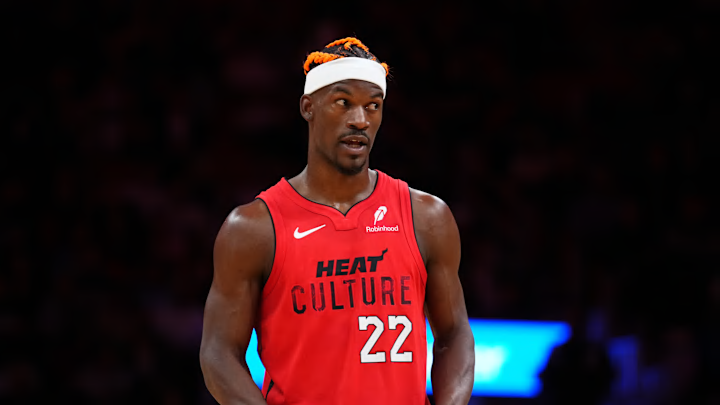It can be maddening watching ESPN speculate about a trade that sends Jimmy Butler to the Phoenix Suns.
During one NBA Countdown segment on Tuesday, the panel did well in discussing the mechanics of a complicated trade framework, Bradley Beal’s no-trade clause and Butler’s fit in Phoenix.
They asked and answered important questions. Would Butler improve the Suns? Check. Would Beal waive his no-trade clause? Check.
But one question, and probably the most important, wasn’t brought up.
Sure, a Beal for Butler trade is possible. But why, exactly, would the Miami Heat do it?
RJ Jefferson on NBA countdown:
— Hot Hot Hoops (@hothothoops) December 17, 2024
“It ain't just about what Jimmy Butler wants, it's also about 'Hey Bradley (Beal), we're sending you someplace else.'"
What about what Miami wants? Who still have Butler under contract? It’s definitely not Beal’s contractpic.twitter.com/HNzCyBV7uk
There's no reason for the Heat to trade Jimmy Butler to the Suns.
After winning four of their last five games, the Heat are sixth in the East, two games out of the fourth. Butler just put up a 35-point, 19-rebound, 10-assist, four-steal triple-double against the Pistons in one of the best games of his Heat tenure.
That’s not to say that the Heat shouldn’t or won’t trade Butler, but dealing him for a 31-year-old Beal on a bad contract isn’t a forward-looking move that mitigates Butler’s potential departure in free agency, nor is it something that improves the team now.
So why do it?
For some reason, this question gets lost amidst the soap opera that has been the Butler story. First, ESPN’s Shams Charania reported that the Heat are open to listening to trade offers for Butler, and named the Houston Rockets, Dallas Mavericks and Golden State Warriors as potential suitors. The next day, he added that the Phoenix Suns had expressed interest in Butler, and that Butler would be open to playing for them. That same day, Butler’s agent, Bernie Lee, fired back at Charania and called the report “fabricated.”
Since then, more national reporters have confirmed Charania’s reporting and Phoenix’s level of interest. Charania went back on ESPN and defended his reporting twice (on First Take and The Pat McAfee Show), causing even more of a stir.
My point is, who cares?
All of these things can be true, and I believe they are. The Heat are open to listening to offers for Butler but not aggressively shopping him. Butler plans to opt out of his contract and enter free agency, and would be open to playing for Phoenix, Golden State, Houston or Dallas should the Heat decide to move on.
That doesn’t mean the Heat are going to trade Butler, and it certainly doesn’t mean they are going to trade him to the Suns.
To clarify, the best package the Suns can offer (as long as Kevin Durant and Devin Booker are not on the table) is Beal, a future first-round pick and three second-round picks. I got into the details of a potential deal here.
As interesting as that future first might be, acquiring Beal would tie up Miami’s finances for the foreseeable future. Beal is owed $53.7 million next season and $57.1 million in the 2026-27 season. This is not the player who scored 31 points per game in 2021. He’s downshifted into a new phase of his career and is averaging 17.8 points on 49% shooting (36% on 3s) this season.
So he’s (a) not as good as Butler, (b) more expensive and (c) under contract for more years.
So, again, I ask: Why?
If the option is between trading Butler for Beal, extending Butler, Butler opting in, or losing Butler for nothing, then every option is better than trading for Beal.
Somehow, this very basic fact – that it takes two teams to agree to a trade – has been lost in the national discourse.
All because an agent tweeted about a report that, even though true, seemed inconsequential in the first place.
